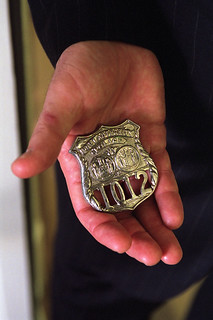*****
* The Miami Herald reported Monday, July 21, that emails were circulated by Dade Correctional Institution administrators, corrections officers and medical staff right after the scalding shower death of 50-year-old, mentally-ill prisoner Darren Rainey. Jail guards allegedly forced Rainey to take a shower that was so hot that Rainey's skin separated from his body, which created this mess of electronic message madness. Electronic correspondence began right after Rainey's body was discovered in a puddle of steaming hot water at the Dade Correctional Institution in 2012, showing many disparities and conflicting and confusing accounts, the major Florida daily reports. (See: http://www.miamiherald.com/2014/07/21/4247793/emails-show-coverup-of-miami-dade.html)
The night of Rainey's death and well into the following morning, jail administrators and corrections officers, along with medical personnel, told widely conflicting stories about what led to Rainey's death. At one point, they even claimed that Rainey had turned up the water temperature, essentially scalding himself to death, according to emails obtained by editorial staff members of the Miami Herald. The investigation into Rainey's death, however, flagged and waned for nearly two years. Then, this spring, the Miami Herald again began asking questions about the matter. Prior to this, neither Miami-Dade police nor Florida Dept. of Corrections (DOC) investigators interviewed witnesses who claimed they had evidence that Rainey was killed by the guards. (See, ibid: http://www.miamiherald.com/2014/07/21/4247793/emails-show-coverup-of-miami-dade.html.)
Florida Gov. Rick Scott on July 21 gave his first comment about this cryptic and controversial alleged shower-stall atrocity, admitting that the Miami-Dade Police Department's investigation into Rainey's death had "taken a long time." The Republican governor, however, has been accused by The Miami Herald of equivocating and "sidestepped questions about why the two guards accused of killing Rainey were allowed to continue to work at the prison after Rainey's death." (See, ibid: http://www.miamiherald.com/2014/07/21/4247793/emails-show-coverup-of-miami-dade.html.)
While corrections officers who placed Rainey in the shower stall, and who were responsible for safeguarding him as he cleaned himself, claim that Rainey was "checked periodically," on June 23, 2012, other inmates who witnessed this showering incident say the guards made the water temperature as hot as it would go, and these guards allegedly mocked and teased Rainey, then walked away as Rainey was reportedly and allegedly left in the small shower stall for nearly two hours under a blasting of scalding hot water. Rainey was serving a two-year sentence for drug possession. He suffered from severe mental illness and was housed in DCI's psych unit. "He finally collapsed and died, his skin so scalded that chunks of his flesh had fallen off his body. Afterward, one inmate claimed he was ordered to clean up the site," The Miami Herald online offering states. (See, ibid: http://www.miamiherald.com/2014/07/21/4247793/emails-show-coverup-of-miami-dade.html.)
-----
* On July 21, The New York Times was the first to report that New York City government officials agreed to pay $2.75 million to settle a lawsuit filed in 2013 in federal court in Manhattan by the family of Ronald Spear, who died in December 2012 in Rikers Island jail. The 52-year-old victim's father said his son was assaulted because of complaining at the jail, and also because of the insufficient medical care Ronald Spear was given. He was arrested for burglary in September, 2012. (See: http://america.aljazeera.com/articles/2014/7/21/rikers-settlementreached.html.)
According to media reports, Ronald Spear suffered from chronic kidney disease and had to use a cane for ambulatory reasons. In late 2012, he filed a lawsuit (separate from the lawsuit filed by his family after his death) against New York City's Dept. of Corrections, blaming them for his being denied medical care and after he complained to jail officers about his health condition (jail workers allegedly reacted violently towards Spear after he made these complaints). The lawsuit alleged that Spear, arrested for burglary in September 2012, had been kicked in the chest and in the face by a correction officer while being pinned down by two other jail guards. The New York City Office of Chief Medical Examiner ruled the death a homicide, citing "blunt force trauma to the head" as a contributing factor, according to the lawsuit. According to media reports, Ronald Spear lived for a short time following this bludgeoning and it was during this time that he filed his lawsuit. (See: http://www.nytimes.com/2014/07/21/nyregion/new-york-city-to-pay-2-75-million-to-settle-suit-in-death-of-rikers-island-inmate.html?hp&action=click&pgtype=Homepage&version=HpHeadline&module=second-column-region -ion=top-news&WT.nav=top-news&_r=0.)
Jonathan S. Chasan, a lawyer with the Legal Aid Society, which helped represent the family, said in The New York Times online page that the case was "yet another example of the persistent problem of excessive force in the New York City jails, a problem that has not been adequately addressed or remediated." (See, ibid: http://www.nytimes.com/2014/07/21/nyregion/new-york-city-to-pay-2-75-million-to-settle-suit-in-death-of-rikers-island-inmate.html?hp&action=click&pgtype=Homepage&version=HpHeadline&module=second-column-region -ion=top-news&WT.nav=top-news&_r=0.) In recent months, a sweeping and intensive investigation into alleged violence and other criminal acts by corrections officers at Rikers Island jail complex has led to the arrest of over a dozen corrections officials. In March, an officer was charged with depriving a mentally ill inmate of medical care after this inmate swallowed a corrosive disinfectant. The inmate eventually died. And earlier this year, too, a convict who suffered from an emotional illness died in an overheated cell and his family has filed a $25 million lawsuit against New York City government. (See: http://america.aljazeera.com/articles/2014/7/21/rikers-settlementreached.html.)
-----
* The U.S. Department of Justice announced on Thursday, July 24, that it reached an agreement with the city of Albuquerque, N.M., to address a "pattern or practice of excessive force" by the problem-plagued Albuquerque Police Department. The DOJ said the city has agreed to allow an independent monitor and the courts to oversee reforms at the police department, along with community input and involvement. According to a joint statement, the department and the city plan to implement reform in eight areas of concern: "use of force policies, interactions with individuals with mental illness and other disabilities, tactical units, training, internal investigations and civilian complaints, management and supervision, recruitment and selection of officers, and community engagement and oversight." (See: http://www.cnn.com/2014/07/24/justice/albuquerque-police-brutality-federal-reforms/index.html?sr=sharebar_facebook.)
Following news of this agreement, U.S. Attorney General Eric Holder said, "This agreement marks an important step forward in addressing the unreasonable use of deadly force uncovered in our investigation into the Albuquerque Police Department.... I am confident that the Albuquerque Police Department will be able to correct troubling practices, restore public trust, and better protect its citizens against all threats and dangers - while providing the model of professionalism and fairness that all Americans deserve." (See, ibid: http://www.cnn.com/2014/07/24/justice/albuquerque-police-brutality-federal-reforms/index.html?sr=sharebar_facebook.)
(Note: You can view every article as one long page if you sign up as an Advocate Member, or higher).






